
List of Russian physicians and psychologists
Encyclopedia
This list of Russia
n physician
s and psychologist
s includes the famous physicians and psychologists, medical scientists and medical doctors from the Russian Federation, the Soviet Union
, the Russian Empire
and other predecessor states of Russia. Physicians of all specialities may be listed here.
Russia
Russia or , officially known as both Russia and the Russian Federation , is a country in northern Eurasia. It is a federal semi-presidential republic, comprising 83 federal subjects...
n physician
Physician
A physician is a health care provider who practices the profession of medicine, which is concerned with promoting, maintaining or restoring human health through the study, diagnosis, and treatment of disease, injury and other physical and mental impairments...
s and psychologist
Psychologist
Psychologist is a professional or academic title used by individuals who are either:* Clinical professionals who work with patients in a variety of therapeutic contexts .* Scientists conducting psychological research or teaching psychology in a college...
s includes the famous physicians and psychologists, medical scientists and medical doctors from the Russian Federation, the Soviet Union
Soviet Union
The Soviet Union , officially the Union of Soviet Socialist Republics , was a constitutionally socialist state that existed in Eurasia between 1922 and 1991....
, the Russian Empire
Russian Empire
The Russian Empire was a state that existed from 1721 until the Russian Revolution of 1917. It was the successor to the Tsardom of Russia and the predecessor of the Soviet Union...
and other predecessor states of Russia. Physicians of all specialities may be listed here.
B
- Aleksandr BakulevAleksandr BakulevAleksandr Nikolayevich Bakulev was a Soviet surgeon, one of the founders of cardiovascular surgery in the USSR.Born in Nevenikovskaya into a peasant family which belonged to the old Vyatka clan of Bakulevs, Bakulev attended the medical faculty of Saratov University after graduating from high...
, prominent cardiovascular surgery developer - Vladimir BekhterevVladimir BekhterevVladimir Mikhailovich Bekhterev was a Russian Neurologist and the Father of Objective Psychology. He is best known for noting the role of the hippocampus in memory, his study of reflexes, and Bekhterev’s Disease...
, neuropathologist, founder of objective psychology, noted the role of the hippocampusHippocampusThe hippocampus is a major component of the brains of humans and other vertebrates. It belongs to the limbic system and plays important roles in the consolidation of information from short-term memory to long-term memory and spatial navigation. Humans and other mammals have two hippocampi, one in...
in memory, major contributor to reflexologyReflexologyReflexology, or zone therapy, is an alternative medicine involving the physical act of applying pressure to the feet, hands, or ears with specific thumb, finger, and hand techniques without the use of oil or lotion...
, studied the Bekhterev’s Disease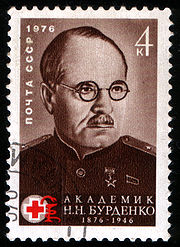
- Vladimir BetzVladimir BetzVladimir Alekseyevich Betz - Russian anatomist and histologist, professor of the Kiev University, famous for the discovery of giant pyramidal neurons of primary motor cortex....
, discovered Betz cells of primary motor cortexPrimary motor cortexThe primary motor cortex is a brain region that in humans is located in the posterior portion of the frontal lobe. Itworks in association with pre-motor areas to plan and execute movements. M1 contains large neurons known as Betz cells, which send long axons down the spinal cord to synapse onto... - Peter BorovskyPeter BorovskyPiotr Fokich Borovsky was Russian and Soviet surgeon and public health administrator who worked in Tashkent, professor of surgery in Tashkent Medical Institute.Borovsky is credited for the first correct description of the causative agent of Oriental sore....
, described the causative agent of Oriental sore - Sergey Botkin, major therapist and court physician
- Nikolay Burdenko, major developer of neurosurgeryNeurosurgeryNeurosurgery is the medical specialty concerned with the prevention, diagnosis, treatment, and rehabilitation of disorders which affect any portion of the nervous system including the brain, spine, spinal cord, peripheral nerves, and extra-cranial cerebrovascular system.-In the United States:In...
- Konstantin ButeykoKonstantin ButeykoKonstantin Pavlovich Buteyko was the creator of the Buteyko method for the treatment of asthma and other breathing disorders.-Early life:Konstantin Pavlovich Buteyko was born on 27 January 1923 into a farming family in Ivanitsa, near Kiev, Ukraine. His father was a keen mechanic and he followed...
, developed the Buteyko methodButeyko methodThe Buteyko method or Buteyko Breathing Technique is a form of complementary or alternative physical therapy that proposes chronic "breathing retraining" as a treatment for asthma as well as other conditions. The method takes its name from the late Ukrainian doctor Konstantin Pavlovich Buteyko ,...
for the treatment of asthma and other breathing disorders
C
- Mikhail ChumakovMikhail ChumakovMikhail Petrovich Chumakov was a Soviet microbiologist and virologist most famous for conducting pivotal large-scale clinical trials that led to licensure of Oral Polio Vaccine developed by Albert B. Sabin....
, co-discovered tick-borne encephalitis, co-developed oral polio vaccinePolio vaccineTwo polio vaccines are used throughout the world to combat poliomyelitis . The first was developed by Jonas Salk and first tested in 1952. Announced to the world by Salk on April 12, 1955, it consists of an injected dose of inactivated poliovirus. An oral vaccine was developed by Albert Sabin...
D
- Livery Darkshevich, neurologistNeurologistA neurologist is a physician who specializes in neurology, and is trained to investigate, or diagnose and treat neurological disorders.Neurology is the medical specialty related to the human nervous system. The nervous system encompasses the brain, spinal cord, and peripheral nerves. A specialist...
, described the nucleus of posterior commissurePosterior commissureThe posterior commissure is a rounded band of white fibers crossing the middle line on the dorsal aspect of the upper end of the cerebral aqueduct. It is important in the bilateral pupillary light reflex....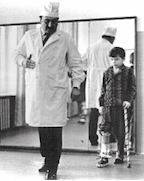
- Vladimir DemikhovVladimir DemikhovVladimir Petrovich Demikhov was a Soviet scientist and organ transplant pioneer, who did several transplantations in the 1930s and 1950s, such as the transplantation of a heart into an animal and a lung-heart replacement in an animal. He is also well-known for his transplantation of the heads of...
, major pioneer of transplantology
F
- Vladimir Filatov, ophthalmologist, corneal transplantation pioneer
- Svyatoslav FyodorovSvyatoslav FyodorovSvyatoslav Nikolayevich Fyodorov was a Russian ophthalmologist, eye microsurgeon, professor, full member of the Russian Academy of Sciences and Russian Academy of Medical Sciences and politician...
, inventor of radial keratotomyRadial keratotomyRadial keratotomy is a refractive surgical procedure to correct myopia.- Discovery :The procedure was discovered by Svyatoslav Fyodorov who removed glass from the eye of one of his patients who had been in an accident. A boy, who wore eyeglasses, fell off his bicycle and his glasses shattered on...
G
- Oleg GazenkoOleg GazenkoOleg Georgovitch Gazenko was a Russian scientist and the former director of Institute of Biomedical Problems in Moscow honoured with the Demidov Prize in 1998. One of the leading scientists behind the Soviet animals in space programmes, he selected and trained Laika, the dog who flew on the...
, founder of space medicineSpace medicineSpace medicine is the practice of medicine on astronauts in outer space whereas astronautical hygiene is the application of science and technology to the prevention or control of exposure to the hazards that may cause astronaut ill health. Both these sciences work together to ensure that...
, selected and trained LaikaLaikaLaika was a Soviet space dog that became the first animal to orbit the Earth – as well as the first animal to die in orbit.As little was known about the impact of spaceflight on living creatures at the time of Laika's mission, and the technology to de-orbit had not yet been developed, there...
, the first space dog - Georgy Gause, inventor of gramicidin SGramicidin SGramicidin S or Gramicidin Soviet is an antibiotic effective against some Gram positive and Gram negative bacteria as well as some fungi. It is a derivative of gramicidin, produced by the Gram positive bacterium Bacillus brevis...
and other antibiotics - Vera GedroitzVera GedroitzPrincess Vera Ignatievna Giedroyc was a Lithuanian princess, a doctor of medicine, a professor, the first female surgeon in Russia, one of the first female professors of surgery in the world, and a writer of poetry and prose.Giedroyc belonged to a Lithuanian princely clan which shared its origins...
, the first female Professor of SurgerySurgerySurgery is an ancient medical specialty that uses operative manual and instrumental techniques on a patient to investigate and/or treat a pathological condition such as disease or injury, or to help improve bodily function or appearance.An act of performing surgery may be called a surgical...
in the world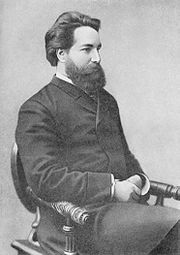
- Ilya Gruzinov, found that vocal foldsVocal foldsThe vocal folds, also known commonly as vocal cords, are composed of twin infoldings of mucous membrane stretched horizontally across the larynx...
are the source of phonationPhonationPhonation has slightly different meanings depending on the subfield of phonetics. Among some phoneticians, phonation is the process by which the vocal folds produce certain sounds through quasi-periodic vibration. This is the definition used among those who study laryngeal anatomy and physiology...
H
- Waldemar HaffkineWaldemar HaffkineWaldemar Mordecai Wolff Haffkine, CIE was a Russian Jewish bacteriologist, whose career was blighted in Russia because "he refused to convert to Russian Orthodoxy." He emigrated and worked at the Pasteur Institute in Paris, where he developed an anti-cholera vaccine that he tried out successfully...
, invented the first vaccines against choleraCholeraCholera is an infection of the small intestine that is caused by the bacterium Vibrio cholerae. The main symptoms are profuse watery diarrhea and vomiting. Transmission occurs primarily by drinking or eating water or food that has been contaminated by the diarrhea of an infected person or the feces...
and bubonic plagueBubonic plaguePlague is a deadly infectious disease that is caused by the enterobacteria Yersinia pestis, named after the French-Swiss bacteriologist Alexandre Yersin. Primarily carried by rodents and spread to humans via fleas, the disease is notorious throughout history, due to the unrivaled scale of death...
I
- Gavriil Ilizarov, invented Ilizarov apparatusIlizarov apparatusThe Ilizarov apparatus is named after the orthopedic surgeon Gavriil Abramovich Ilizarov from the Soviet Union, who pioneered the technique. It is used in surgical procedures to lengthen or reshape limb bones; to treat complex and/or open bone fractures; and in cases of infected non-unions of bones...
, developed distraction osteogenesisDistraction osteogenesisDistraction osteogenesis, also called callus distraction, callotasis and osteodistraction is a surgical process used to reconstruct skeletal deformities and lengthen the long bones of the body...
K
- Nikolai KorotkovNikolai KorotkovNikolai Sergeyevich Korotkov was a Russian surgeon, a pioneer of 20th century vascular surgery, and the inventor of auscultatory technique for blood pressure measurement.-Associated eponyms:...
, invented auscultatory blood pressure measurement, pioneer of vascular surgeryVascular surgeryVascular surgery is a specialty of surgery in which diseases of the vascular system, or arteries and veins, are managed by medical therapy, minimally-invasive catheter procedures, and surgical reconstruction. The specialty evolved from general and cardiac surgery....png)
- Sergey Korsakov, studied the effects of alcoholismAlcoholismAlcoholism is a broad term for problems with alcohol, and is generally used to mean compulsive and uncontrolled consumption of alcoholic beverages, usually to the detriment of the drinker's health, personal relationships, and social standing...
on the nervous systemNervous systemThe nervous system is an organ system containing a network of specialized cells called neurons that coordinate the actions of an animal and transmit signals between different parts of its body. In most animals the nervous system consists of two parts, central and peripheral. The central nervous...
, described Korsakoff's syndromeKorsakoff's syndromeKorsakoff's syndrome is a neurological disorder caused by the lack of thiamine in the brain. Its onset is linked to chronic alcohol abuse and/or severe malnutrition...
, introduced paranoiaParanoiaParanoia [] is a thought process believed to be heavily influenced by anxiety or fear, often to the point of irrationality and delusion. Paranoid thinking typically includes persecutory beliefs, or beliefs of conspiracy concerning a perceived threat towards oneself...
concept - Aleksei KozhevnikovAleksei KozhevnikovAleksei Yakovlevich Kozhevnikov was a Russian neurologist and psychiatrist who was a native of Ryazan.From 1853 until 1858 he studied medicine at the University of Moscow, and furthered his education in Germany, Switzerland, England and France...
, neurologist and psychiatrist, described the epilepsia partialis continuaEpilepsia partialis continuaEpilepsia partialis continua is a rare type of brain disorder in which a patient experiences recurrent motor epileptic seizures that are focal , and recur every few seconds or minutes for extended periods .-Presentation:During these seizures, there is repetitive focal myoclonus or Jacksonian...
L
- Aleksey LeontyevAleksey LeontyevAlexei Nikolaevich Leont'ev , Soviet developmental psychologist, the founder of activity theory.- Biography :A.N. Leont'ev worked with Lev Vygotsky and Alexander Luria from 1924 to 1930, collaborating on the development of a Marxist psychology as a response to behaviourism and the focus on the...
, founder of activity theoryActivity theoryActivity theory is a psychological meta-theory, paradigm, or theoretical framework, with its roots in Lev Semyonovich Vygotsky's cultural-historical psychology. Its founders were Alexei N...
in psychology - Peter LesgaftPeter LesgaftPeter Franzevich Lesgaft was a Russian teacher, anatomist, physician and social reformer. He was the founder of the modern system of physical education and medical-pedagogical control in physical training, one of founders of theoretical anatomy. P.F. Lesgaft Institute of Physical Culture in St...
, founder of the modern system of physical educationPhysical educationPhysical education or gymnastics is a course taken during primary and secondary education that encourages psychomotor learning in a play or movement exploration setting....
in Russia - Alexander LuriaAlexander LuriaAlexander Romanovich Luria was a famous Soviet neuropsychologist and developmental psychologist. He was one of the founders of neuropsychology and the jointly led the Vygotsky Circle.- Biography :...
, co-developer of activity theory and cultural-historical psychologyCultural-historical psychologyCultural-historical psychology is a theory of psychology founded by Lev Vygotsky at the end of the 1920s and developed by his students and followers in...
, major researcher of aphasiaAphasiaAphasia is an impairment of language ability. This class of language disorder ranges from having difficulty remembering words to being completely unable to speak, read, or write....
M
- Ilya Mechnikov, pioneer researcher of immune systemImmune systemAn immune system is a system of biological structures and processes within an organism that protects against disease by identifying and killing pathogens and tumor cells. It detects a wide variety of agents, from viruses to parasitic worms, and needs to distinguish them from the organism's own...
, probiotics and phagocytosis; coined the term gerontologyGerontologyGerontology is the study of the social, psychological and biological aspects of aging...
, Nobel Prize in Medicine winner.png)
- Lazar Minor, neurologist, described Minor's diseaseMinor's diseaseMinor's disease, a syndrome involving the sudden onset of back pain and paralysis caused by haemorrhage into the spinal cord substance, was named after the Russian neurologist, Lazar Salomowitch Minor ....
O
- Alexey OlovnikovAlexey OlovnikovAlexey Matveyevich Olovnikov is a Russian biologist. In 1973, he was the first to recognize the problem of telomere shortening, to predict the existence of telomerase, and to suggest the telomere hypothesis of aging and the relationship of telomeres to cancer He was not awarded a share of the...
, predicted existence of TelomeraseTelomeraseTelomerase is an enzyme that adds DNA sequence repeats to the 3' end of DNA strands in the telomere regions, which are found at the ends of eukaryotic chromosomes. This region of repeated nucleotide called telomeres contains non-coding DNA material and prevents constant loss of important DNA from...
, suggested the Telomere hypothesis of aging and the Telomere relations to cancer
P
- Ivan PavlovIvan PavlovIvan Petrovich Pavlov was a famous Russian physiologist. Although he made significant contributions to psychology, he was not in fact a psychologist himself but was a mathematician and actually had strong distaste for the field....
, founder of modern physiologyPhysiologyPhysiology is the science of the function of living systems. This includes how organisms, organ systems, organs, cells, and bio-molecules carry out the chemical or physical functions that exist in a living system. The highest honor awarded in physiology is the Nobel Prize in Physiology or...
, the first to research classical conditioningClassical conditioningClassical conditioning is a form of conditioning that was first demonstrated by Ivan Pavlov...
, influenced comparative psychologyComparative psychologyComparative psychology generally refers to the scientific study of the behavior and mental processes of non-human animals. However, scientists from different disciplines do not always agree on this definition...
and behaviorismBehaviorismBehaviorism , also called the learning perspective , is a philosophy of psychology based on the proposition that all things that organisms do—including acting, thinking, and feeling—can and should be regarded as behaviors, and that psychological disorders are best treated by altering behavior...
by his works on reflexReflexA reflex action, also known as a reflex, is an involuntary and nearly instantaneous movement in response to a stimulus. A true reflex is a behavior which is mediated via the reflex arc; this does not apply to casual uses of the term 'reflex'.-See also:...
es, Nobel Prize in Medicine winner - Nikolay Pirogov, pioneer of etherEtherEthers are a class of organic compounds that contain an ether group — an oxygen atom connected to two alkyl or aryl groups — of general formula R–O–R'. A typical example is the solvent and anesthetic diethyl ether, commonly referred to simply as "ether"...
anaesthesia and modern field surgery, the first to perform anaesthesia in the field conditions, invented a number of surgical operations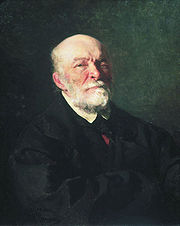
- Viktor ProtopopovVictor Pavlovich ProtopopovVictor Pavlovich Protopopov - famous Russian, Ukrainian and Soviet psychiatrist, member of the URSR Academy of Sciences. Being a pupil of Vladimir Bekhterev, Protopopov had founded his own pathophysiological school of thought in the Soviet psychiatry...
, founder of his own pathophysiological school of thought, namesake of Protopopov's syndrome
R
- Leonid RogozovLeonid RogozovLeonid Ivanovich Rogozov was a Russian general practitioner who took part in the sixth Soviet Antarctic Expedition in 1960-1961. He was the only doctor stationed at the Novolazarevskaya Station and, while there, developed peritonitis, which meant he had to perform an appendectomy on himself, a...
, performed an appendectomy on himself during the 6th Soviet Antarctic ExpeditionSoviet Antarctic ExpeditionThe Soviet Antarctic Expedition was part of the Arctic and Antarctic Research Institute of the Soviet Committee on Antarctic Research of the Academy of Sciences of the USSR....
, a famous case of self-surgerySelf-surgerySelf-surgery is the act of performing a surgical procedure on oneself. It can be a rare manifestation of a psychological disorder, an attempt to avoid embarrassment or legal action, or an act taken in extreme circumstances out of necessity.- Genital :... - Grigory Rossolimo, pioneer of child neuropsychologyNeuropsychologyNeuropsychology studies the structure and function of the brain related to specific psychological processes and behaviors. The term neuropsychology has been applied to lesion studies in humans and animals. It has also been applied to efforts to record electrical activity from individual cells in...
- Vladimir RothVladimír RothVladimír Roth is a Czech professional ice hockey defenceman who currently plays for HC Slavia Praha of the Czech Extraliga.Roth played previously for London Knights.-External links:...
, neuropathologist, described meralgia paraestheticaMeralgia paraestheticaMeralgia paraesthetica , or meralgia paresthetica — also called Bernhardt-Roth syndrome — is numbness or pain in the outer thigh not caused by injury to the thigh, but by injury to a nerve that extends from the thigh to the spinal column.This chronic neurological disorder involves a single...
S
- Ivan SechenovIvan SechenovIvan Mikhaylovich Sechenov near Simbirsk, Russia – , Moscow), was a Russian physiologist, named by Ivan Pavlov as "The Father of Russian physiology"...
, founder of electrophysiologyElectrophysiologyElectrophysiology is the study of the electrical properties of biological cells and tissues. It involves measurements of voltage change or electric current on a wide variety of scales from single ion channel proteins to whole organs like the heart...
and neurophysiologyNeurophysiologyNeurophysiology is a part of physiology. Neurophysiology is the study of nervous system function...
, author of the classic work ReflexReflexA reflex action, also known as a reflex, is an involuntary and nearly instantaneous movement in response to a stimulus. A true reflex is a behavior which is mediated via the reflex arc; this does not apply to casual uses of the term 'reflex'.-See also:...
es of the BrainBrainThe brain is the center of the nervous system in all vertebrate and most invertebrate animals—only a few primitive invertebrates such as sponges, jellyfish, sea squirts and starfishes do not have one. It is located in the head, usually close to primary sensory apparatus such as vision, hearing,... - Vladimir SerbskyVladimir SerbskyVladimir Petrovich Serbsky was one of the founders of the forensic psychiatry in Russia. An author of The Forensic Psychopathology, Serbskiy thought delinquency to have no congenital diatheses, considering it to be caused by social reasons....
, founder of forensic psychiatryForensic psychiatryForensic psychiatry is a sub-speciality of psychiatry and an auxiliar science of criminology. It encompasses the interface between law and psychiatry...
in Russia - Nikolay SklifosovskiyNikolay SklifosovskiyNikolai Vasilyevich Sklifosovsky was a Russian surgeon and physiologist of Ukrainian origin. He was born near the town of Dubasari, which is now in Transnistria. Sklifosovsky was a professor of medicine in Saint Petersburg and Kiev...
, prominent 19th century field surgeon - Lina SternLina SternLina Solomonovna Stern was a notable Soviet biochemist, physiologist and humanist whose medical discoveries saved thousands of lives at the fronts of World War II...
, pioneer researcher of blood-brain barrierBlood-brain barrierThe blood–brain barrier is a separation of circulating blood and the brain extracellular fluid in the central nervous system . It occurs along all capillaries and consists of tight junctions around the capillaries that do not exist in normal circulation. Endothelial cells restrict the diffusion...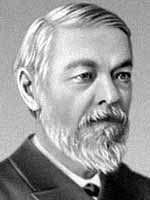
V
- Alexander VarshavskyAlexander VarshavskyAlexander Varshavsky is a Russian-American biochemist and recipient of the Albert Lasker Award for Basic Medical Research, the Wolf Prize in Medicine and the Louisa Gross Horwitz Prize from Columbia University in 2001 for his research on ubiquitination...
, researched ubiquitinUbiquitinUbiquitin is a small regulatory protein that has been found in almost all tissues of eukaryotic organisms. Among other functions, it directs protein recycling.Ubiquitin can be attached to proteins and label them for destruction...
ation, Wolf Prize in MedicineWolf Prize in MedicineThe Wolf Prize in Medicine is awarded once a year by the Wolf Foundation in Israel. It is one of the six Wolf Prizes established by the Foundation and awarded since 1978; the others are in Agriculture, Chemistry, Mathematics, Physics and Arts. The Prize is probably the third most prestigious award...
winner - Vikenty VeresayevVikenty VeresayevVikenty Vikentyevich Veresaev , , was a Russian writer and medical doctor. His real last name was Smidovich.-Early life:...
, Russian/Soviet doctor, author of Memoirs of a Physician - Luka Voyno-YasenetskyLuka Voyno-YasenetskyArchbishop Luka was a Russian outstanding surgeon, the founder of purulent surgery, a spiritual writer, a bishop of Russian Orthodox Church, and an archbishop of Simferopol and of the Crimea since May 1946...
, founder of purulent surgerySurgerySurgery is an ancient medical specialty that uses operative manual and instrumental techniques on a patient to investigate and/or treat a pathological condition such as disease or injury, or to help improve bodily function or appearance.An act of performing surgery may be called a surgical...
, saint - Lev VygotskyLev VygotskyLev Semyonovich Vygotsky was a Soviet psychologist, the founder of cultural-historical psychology, and the leader of the Vygotsky Circle.-Biography:...
, founder of cultural-historical psychologyCultural-historical psychologyCultural-historical psychology is a theory of psychology founded by Lev Vygotsky at the end of the 1920s and developed by his students and followers in...
, major contributor to child developmentChild developmentChild development stages describe theoretical milestones of child development. Many stage models of development have been proposed, used as working concepts and in some cases asserted as nativist theories....
and psycholinguisticsPsycholinguisticsPsycholinguistics or psychology of language is the study of the psychological and neurobiological factors that enable humans to acquire, use, comprehend and produce language. Initial forays into psycholinguistics were largely philosophical ventures, due mainly to a lack of cohesive data on how the...
, introduced zone of proximal developmentZone of proximal development“The zone of proximal development defines functions that have not matured yet, but are in a process of maturing. The zone of proximal development , often abbreviated ZPD, is the difference between what a learner can do without help and what he or she can do with help...
and cultural mediationCultural mediationCultural mediation is one of the fundamental mechanisms of distinctly human development according to cultural–historical psychological theory introduced by Lev Vygotsky and developed in the work of his numerous followers worldwide.-Introduction:...
concepts
W
- Josias WeitbrechtJosias WeitbrechtJosias Weitbrecht was a known German Professor of Medicine and Anatomy in Russia.-Life and career:...
, the first to describe the construction and function of intervertebral discIntervertebral discIntervertebral discs lie between adjacent vertebrae in the spine. Each disc forms a cartilaginous joint to allow slight movement of the vertebrae, and acts as a ligament to hold the vertebrae together.-Structure:...
s
Z
- Alexander ZalmanovAlexander ZalmanovAbraham Zalmanov , He was born in Gomel, Russian Empire , to a Jewish family. He invented a method of capillaries restoration with special Turpentine bath tonic which includes organic turpentine...
, developer of turpentine bath therapy - Bluma ZeigarnikBluma ZeigarnikBluma Wulfovna Zeigarnik was a Soviet psychologist and psychiatrist, a member of Berlin School of experimental psychology and Vygotsky Circle...
, psychiatrist, discovered the Zeigarnik effect, founded experimental psychopathologyPsychopathologyPsychopathology is the study of mental illness, mental distress, and abnormal/maladaptive behavior. The term is most commonly used within psychiatry where pathology refers to disease processes...
See also
- List of physicians
- List of psychologists
- List of Russian scientists
- List of Russian inventors
- Science and technology in RussiaScience and technology in RussiaScience and technology in Russia developed rapidly since the Age of Enlightenment, when Peter the Great founded the Russian Academy of Sciences and Saint Petersburg State University and polymath Mikhail Lomonosov founded the Moscow State University, establishing a strong native tradition in...

